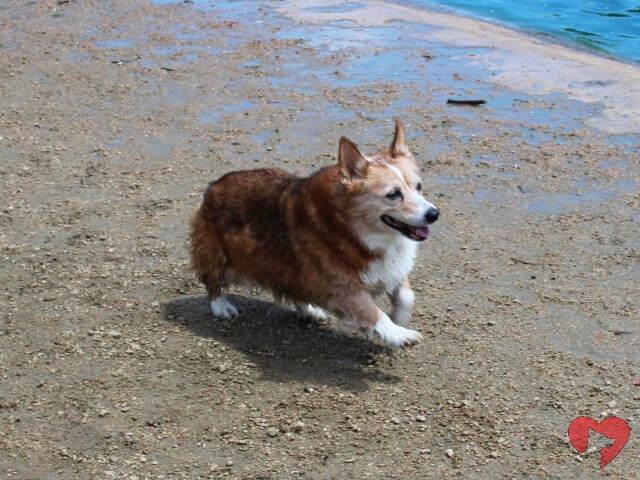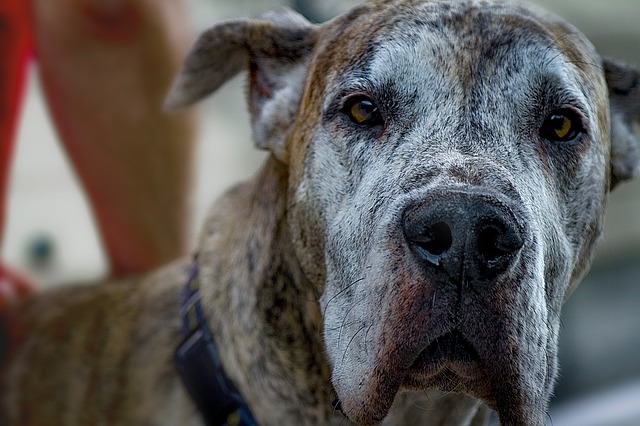The hardest part about having a furry friend is watching them grow old so much more quickly than the humans in our lives. Just as people tend to need more help as they get older, so do our pets. Luckily, there are many things you can do to help increase the length and quality of your dog’s life. Senior dogs do require a little bit of extra care, but the love they show us is worth it.

What is the definition of a senior dog? Since large dogs tend to have shorter lifespans, they also tend to be considered elderly at a much younger age. A Great Dane, for example, might be considered a senior dog as young as 5-6 years old. Golden Retrievers are considered senior starting around 8-10 years of age. Small dogs like Chihuahuas can reach 10-11 years old before showing any signs or symptoms of being elderly. This website has charts that help you convert your dog’s age to human years.
What are some signs and symptoms that your dog is becoming a senior citizen? According to PetMD, symptoms of growing older include: vision loss or eye problems; increased or strained urination; bad breath, bloody gums, or other dental issues; lumps, bumps, or other skin problems; gaining or losing weight; difficulty moving; and behavior or memory problems.
We can’t prevent all the problems that come with aging, but we can try to help our dogs live well in their senior years. Here are 6 things every senior dog owner should do to increase the quality of their senior dog’s life.
#1 – Feed a high quality diet
While all dogs should get the best-quality food, it’s especially important for senior dogs to have specialized, healthy diets. Senior dogs usually need diets that are lower in calories and higher in fiber to prevent them from gaining weight as their metabolism slows down and they become less active. Senior dogs may also lose their sense of smell and lose interest in food, so it’s crucial to find something healthy that they’ll be willing to eat. Talk to your vet about what sort of diet might be best for your dog as he ages.

#2 – Add supplements
Even the best diet might not provide all the nutrients your senior dog needs to truly feel his best. Multivitamins can help fill in any holes in your dog’s diet and help with their energy levels. Cranberry supplements may support urinary tract health. Omega-3 can help improve your dog’s skin and coat. Some supplements help maintain vision and eye health. SAM-e can help protect brain and liver function. Other supplements help maintain joint health and can relieve joint distress and reduce inflammation. Talk to your vet and do some independent research to decide which multivitamins or supplements would be the most beneficial for your dog.
#3 – Take care of your dog’s teeth
Did you know that the toxins from dental diseases can enter your dog’s blood stream and, in extreme cases, can lead to organ failure and death? Even if your dog’s bad teeth don’t kill him, the pain that can accompany serious dental problems should be enough for you to want to do as much as possible to prevent those problems from starting. Ideally, you should be brushing your dog’s teeth every day, but if your dog won’t let you do that, there are many products on the market that will help remove some of the plaque and tartar from your dog’s teeth.
Dental sprays and tooth wipes are gentler alternatives to a toothbrush and doggy toothpaste. Chew toys and bully sticks can help scrape plaque and tartar off your dog’s teeth while they satisfy their natural urge to chew. Dental treats allow you to spoil your dog with a treat that also helps to clean their teeth.

#4 – Exercise
You might be tempted to allow your dog to lie around the house more as they start to slow down, but exercise is just as important to older dogs as it is to puppies. It’s arguably more important for senior dogs to get exercise, because they’re more prone to obesity, which causes a number of health-related problems. Also, dogs with arthritis and other joint problems actually benefit from light exercise every day. It helps keep their joints loose and limber and relieves stiffness. Most dogs also really enjoy a good walk, so you’re adding to their quality of life by continuing their normal walking routine, even if you may need to take shorter, slower walks.
#5 – Accommodate their needs
As your dog slows down and develops joint, mobility, vision, or hearing problems, he may need extra accommodations around your house. Small dogs may need to be carried up or down stairs or onto or off of furniture. Larger dogs may need ramps to get in and out of the car or stairs around your house. Dogs that are losing their vision may benefit from having padding on the corners of furniture. Arthritic dogs may appreciate a plusher dog bed to ease the pressure on their joints.

#6 – Decide when it’s appropriate to say goodbye
How will you know when it’s time to say goodbye to your fur child? We are fortunate that we are able to end our pet’s suffering, but it’s also a burden to decide when your pet is suffering and should be led across the Rainbow Bridge. The Quality of Life Scale on this website can help you decide when your dog’s quality of life has diminished to the point that it’s in their best interest to say goodbye. The criterion used in the scale include how well your dog’s pain is being managed, whether they are eating and drinking enough, whether they are able to avoid soiling themselves, how happy they seem, how well they can move without assistance, and whether or not their good days outnumber their bad days.
You might set your own markers. A dog that loves to fetch might be ready when they lose interest in chasing balls; a dog that loves to eat may be ready when they go on a hunger strike; and a dog that loves its family may be ready when it suddenly starts to hide. Our dogs have their own ways of telling us when they are ready to move on; it’s up to us to listen and let them go with dignity.
(H/T: AVMA, PetMD, Dogtime, PetMD, WebMD Pets, IBPSA, PetMD, PetMD)
